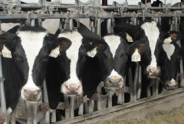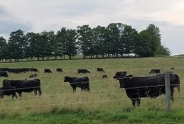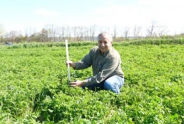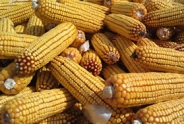June is Dairy Month and the Economic Squeeze Continues...
David Balbian, Area Dairy Specialist
Central New York Dairy and Field Crops
Article from June 2012...Although costs have declined a bit over the last couple of months, the milk price has as well. As I write this, the current information from the Federal Milk Order 1 Market Administrator's Office shows the Statistical Uniform Price for May based on average components is $17.13 for milk delivered to Boston, $16.58 for plants in the Albany/Binghamton zone, and $16.38 for the Syracuse zone.
Oil prices have declined over the last couple of months as well as corn & soybeans. However, none have declined very much. The last MILC projections I have seen shows the April pay rate at $1.322 per cwt.! Although milk futures in nearby months have improved, Class III has improved a lot actually, MILC projections are for payments of $0.70 to $1.00 through July milk. It sure helps to get payments like that, but economically it's better to have better market conditions.
Greek yogurt demand is the bright spot. The tremendous demand for Greek Style Yogurt is nothing but amazing. Expansions at plants in South Edmeston & Johnstown, along with new plants being built in Batavia are making upstate New York the Greek Yogurt Capital of the United States! These plants provide local jobs that contribute to the local economy. However, it has been a bit frustrating for some local producers who have been hoping for higher milk prices because of this local milk demand. Milk used for yogurt is Class II milk. More Class II utilization tends to actually drop the blend price (or if you prefer to call it the Statistical Uniform Price) a bit. More Class I use (for fluid consumption) would increase the blend price. However, even though milk used for yogurt is Class II milk, think about where prices would be if Greek yogurt demand did not exist? Perhaps around 100 tractor trailer loads of milk that is now being used in our area for Greek yogurt production would need to find a home! If that went into butter and powder (Class VI) we would see on-farm milk prices that would be much lower than we have now!
The call for more milk production in the Northeast to meet the new local demand for Greek yogurt production creates great hesitancy on the part of New York dairy producers. Because the economic scars of 2009 and 2006 (along with the current downturn in milk price) are all too recent, this call for additional production is being met with hesitation and caution. Many producers have not completely recovered from the economic calamity of 2009 and are not in a position to borrow more money to expand their operations even if they wanted to. We have seen some expansions on individual farms, but many others who may be in a position to expand are being cautious and conservative. And who can blame them? The volatility in milk prices certainly creates an atmosphere of economic uncertainty.
On a similar note, a report published in June 2012 by Farm Credit East and Cornell's Pro-Dairy program provides some insight into the financial implications that a New York dairy farm would face when expanding from 190 to 290 cows.
200 cows is the threshold at which a dairy farm in NYS becomes a Medium CAFO (Confined Animal Feeding Operation) and is required to meet all the regulations that go along with that designation. If you would like to read the complete report simply email or call me and I will get a copy to you.
When making projections like this a number of assumptions need to be made about the future. Because a listing of these assumptions would take up much of this newsletter I will simply say that I believe the authors took great pains to make realistic assumptions. These assumptions are outlined in the report. (wo/CAFO exp. = without CAFO expenses w/CAFO exp. = with CAFO expenses)
The bottom line is that the CAFO designation most often requires substantial investments in a manure storage and the associated equipment. Additional debt payments need to be met along with some additional annual expenses that did not occur prior to the CAFO designation.
To give you an idea of the financial impact I will use "cash margin" as the indicator of the financial impacts of this hypothetical situation. Cash margin is the amount of cash available, after operations, and after making loan principal and interest payments.
2011 2012 2014 2012 2014
(wo/CAFO exp.) (wo/CAFO exp.) (w/CAFO exp.) (w/CAFO exp.)
Cow numbers 190 290 290 290 290
Cash margin $35,991 $18,465 $27,921 ($13,395) $12,296
Percent net worth 75% 64% 68% 59% 64%
As you can see, the additional debt taken on for this expansion does have a negative effect for a few years on the cash margin. That negative effect is even greater when the investment and expenses to meet the CAFO requirements are factored in. One would expect that if these projections were carried forward the cash margin would eventually recover and overtake the cash margin with fewer cows (2011). However, it's a much steeper hill to climb when the CAFO requirements need to be met. The lower percent net worth and the associated lower cash margin (for several years at least) along with risks associated with market volatility (which are not factored into this report) are an additional burden that many are not willing to take on. This illustrates an additional factor inhibiting dairy expansions in New York State.
So, what is the bottom line here for dairy producers in our region? I believe it comes down to a case by case situation. If you are milking 20, 200, or 2,000 cows I think the same basic questions and issues apply. What do you and your family want to achieve with the business? Do you want to spend more time being a manager and less time working with the dairy herd? Herd expansion moves you in that direction. What is your tolerance to economic risk? Are you comfortable with the higher levels of debt that expansion usually brings? Larger herds do have the opportunity to make more money, but additional tolerance for risk is one of the tradeoffs.
You may be satisfied staying at your current herd size, whatever that is. It usually pays to get better before you get bigger. For many people simply making improvements and getting better may be the goal. Perhaps you enjoy having the cows out on grass and have a passion for grazing (intensive or not). That may (or may not) limit your ability to expand. Perhaps you have chosen to produce organic milk. The price is higher and more stable, but it does cost more to produce organic milk. There are actually some people who are now marketing milk from grass fed dairy animals and receiving a price higher than the organic milk price. Perhaps you want to take on a value added enterprise, such as producing yogurt, cheese, or other dairy products. That's a whole additional enterprise with it's own set of challenges. The bottom line is that you need to do what is best for you (and your family, if they are involved in the business). Don't worry about the industry as a whole. The industry will do what the industry does. Your individual farm decisions will not change the industry. You need to do what is best for you.
Upcoming Events
Pesticide Applicator Exam Prep Course
February 2, 2026 : Pesticide Applicator Exam Prep Course - Ballston Spa
Ballston Spa, NY
February 5, 2026 : Pesticide Applicator Exam Prep Course - Cobleskill
Cobleskill, NY
CANCELLED
February 6, 2026 : Pesticide Applicator Exam Prep Course - Herkimer
Herkimer, NY
February 9, 2026 : Pesticide Applicator Exam Prep Course - Morrisville
Morrisville, NY
February 13, 2026 : Pesticide Applicator Exam Prep Course - Norwich
Norwich , NY
I Thought I Was Covered for That! - Farm Insurance Webinar Series
January 13, 2026
January 20, 2026
January 27, 2026
February 3, 2026
February 10, 2026
Free Webinar Series
Swine Production Zoom Series
February 5, 2026
February 19, 2026
March 5, 2026
March 19, 2026
April 2, 2026
Register for the whole series or for one or several sessions.
Announcements
Statewide Field Crop Pathology Needs Assessment Survey
Your input is wanted for identifying priorities!Sign Up for Our Weekly E-Newsletter
We send out a bi-weekly e-newsletter that has announcements, upcoming programs, and opportunities for you! Registration is quick, easy, and free. Click here to sign up today!Farmers Can Join MeatSuite For Free!
MeatSuite.com is a free resource provided by Cornell University where NY meat farmers can create a farm profile and list their bulk (wholes, halves, quarters) and bundled (i.e. Grilling Bundle) meat products.Why should farmers join?
1. It's free and easy!
2. Connect with more local customers. In the past year the MeatSuite.com farm directory had 8,300 visits from New York consumers. Farm profiles get as many as 25 views per month from potential local customers. We also spotlight MeatSuite farms on social media and bring attention and purchases to farms through highlights and giveaways.
How do I join?
Farmers can visit https://www.meatsuite.com/farmers/ to create a free farm profile. You must list at least one product for your farm's profile to go live. You'll also have access to Cornell's free Meat Price Calculator, a helpful tool for pricing your meat to make a profit.
While you're on MeatSuite, check out the "Creating Consumer-Friendly Bulk Meats" publication on the log-in page. It has tips on how to create bulk meat products that are easier for first-time buyers to say "yes" to.
If you have any questions as you create your farm profile or products, we're here to help! Please email Matt LeRoux at mnl28@cornell.edu.




